2022 Mescher Scholars

Nicholas Buhta
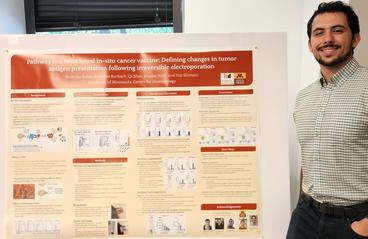
Nicholas graduated from Wagner College in Staten Island, NY with a BS in Biology. As an undergrad, he carried out summer research at the Johns Hopkins University investigating neurotransmitters in Autism. During the summer program, Nicholas worked with Dr. Yoji Shimizu to investigate the effects of irreversible electroporation on passive tumor antigen transport as well as migration of tumor antigen-bearing presenting cells to the draining lymph nodes, with the goal of optimizing tumor antigen vaccination and tumor clearing. Their work determined that irreversible electroporation significantly increases the passive transfer of tumor antigen into draining lymph nodes.
"A Broadened In-Situ Cancer Vaccine and IRE"
Jonah Butler
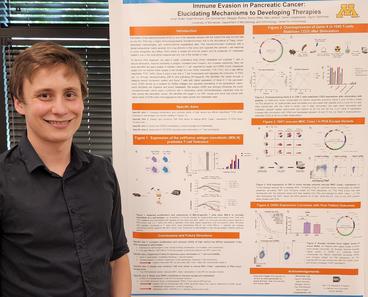
Jonah is a graduate of the Massachusetts Institute of Technology where he received BS degrees in both Chemical Engineering and Biology. Following graduation, Jonah undertook 2 years of full-time research into the TCRs that are important to immunotherapy in the laboratory of Philip Greenberg at the Fred Hutchinson Cancer Research Institute. In our program, Jonah joined the lab of Dr. Ingunn Stromnes and took part in an investigation of the role of OTUD7B in cancer-specific cytotoxic T cells. Jonah over-expressed OTUD7B in T cells and found stabilized CD25 expression, consistent with improved activation of the cells.
"TCR Engineering for Treating Pancreatic Cancer"
Martha DeMueles
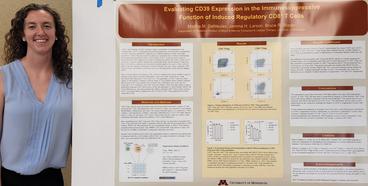
Martha received a BS degree in Microbiology from the University of Wisconsin-Madison. Her summer undergraduate research in IgE mediated disease led to a publication with Dan Conrad. Later, she worked at the Fred Hutchinson Cancer Research Institute for a period of 2.5 years investigating the microbiome following hematopoietic stem cell transplantation. During our summer program, Martha undertook a research project under Dr. Bruce Blazar to study the generation of CD8+ CD39+ Treg cells. Her results showed that in vitro inhibition of C39 function using ARL67156 led to reduced suppressive activity by these Treg cells.
"Evaluating CD39 Expression in the Immunosuppressive Function of Induced Regulatory CD8+ T Cells"
Austin Hoeg
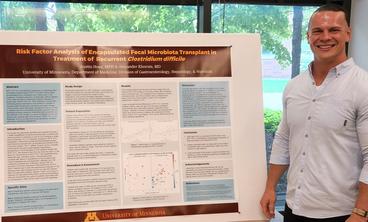
Austin Hoeg received both BS (Kinesiology) and MPH (Public Health Nutrition) degrees from the University of Minnesota Twin Cities. His previous research included a study of muscle sarcopenia following the use of left ventricular assist devices, and this research was published. During the summer, Austin worked with Dr. Alex Khoruts to identify factors that lead to increased success following encapsulated fecal microbiota transplantation. His data now point to the role of advanced age as the most important factor in FMT failure.
Eesha Irfanullah
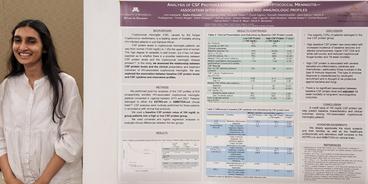
Eesha double-majored in Biomedical Engineering and Technical Writing and Communication at the University of Minnesota Twin Cities. As an undergrad she engineered cell lines for large-scale production of recombinant viruses and proteins. In our program, she spent the summer working with Dr. David Boulware to determine the relationships between CSF protein levels in Cryptococcal Meningitis and patient outcomes. They determined that patients with high CSF protein levels demonstrated increased inflammation that appeared to clear the cryptococcus more quickly and allow for improved outcome.
"Analysis of CSF Protein Levels in HIV-Related Cryptococcal Meningitis"
Melanie Quick
Melanie received her BS in Biomedical Engineering from the Boston University College of Engineering. As an undergraduate researcher, she investigated the role of TCR affinity and avidity in the graft-vs-leukemia effect. During our summer research program, Melanie worked with Dr. Vaiva Vesyz to study infectious agents expressing self-antigens as vaccines in immunotherapy. Melanie’s results demonstrate the ability of VSV virus vaccination to improve the proliferative capacity of self-reactive CD8 T cells.
"Interrogation of CD8+ T cell tolerance reversal using infectious agents expressing self-antigen"
Christine Tanna
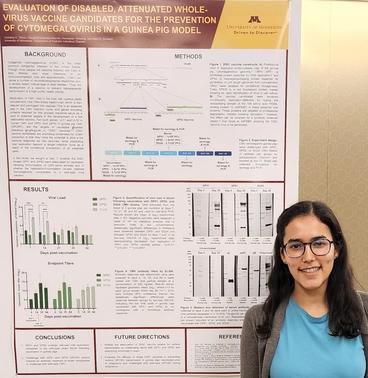
Christine attended Williams College in Massachusetts where she received a BA in Biology and English. As an undergraduate she investigated the protein ASAP1 and its ability to promote ovarian cancer cell invasion. During her summer in our program, Christine worked with Dr. Mark Schleiss to develop a vaccine for pregnant women against congenital Cytomegalovirus in neonates. Her research demonstrated immune responses could be generated against the CMV GP51, GP52, and SG24 proteins.